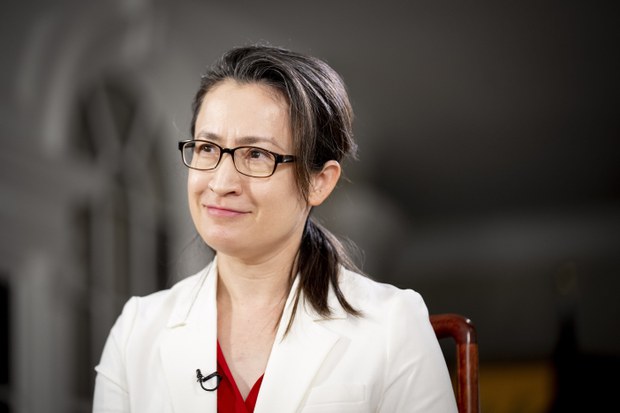Barred from the mainland…again. China sanctions Taipei’s de facto US ambassador
Share

Taiwan’s chief U.S. envoy Bi-khim Hsiao being interviewed by The Associated Press at the Taipei Economic and Cultural Representative Office in Washington, Jan. 20, 2023.
Beijing on Friday announced further sanctions against the Taiwanese de facto ambassador to the United States following the meeting between Taiwan’s president and the U.S. House speaker, China’s Taiwan Affairs Office said.
New “punishments” with immediate effect have also been imposed against two organizations, the Taiwan Prospect Foundation and the Council of Asian Liberals and Democrats.
China also announced sanctions on U.S.-based Hudson Institute, Ronald Reagan Presidential Library, and their four senior officials.
Bi-khim Hsiao, Head of the Taipei Economic and Cultural Representative Office in the U.S., as well as her family members, will be “strictly” banned from entering the mainland, Hong Kong and Macau, a spokesperson for China’s Taiwan Affairs Office said.
Hsiao’s financial sponsors and related businesses will also be banned from “cooperating with mainland organizations and individuals.”
“All other necessary punitive measures will be taken to ensure lifelong accountability according to law,” the spokesperson warned.
Hsiao, who is being labeled “a diehard Taiwan independence separatist” by Beijing, responded on Twitter: “Wow, the PRC just sanctioned me again, for the second time,” referring to China by its official name the People’s Republic of China.
Last August following a visit by then-U.S. House Speaker Nancy Pelosi to Taiwan, China imposed an entry ban on Pelosi and her immediate family members, as well as Hsiao and six other Taiwanese officials and lawmakers.
The measures are believed to have little impact as Hsiao does not travel to China and her family has no business interests in the mainland.
‘Resolve, will and ability’
Similar sanctions were also imposed on two Taiwanese organizations – the Prospect Foundation and the Council of Asian Liberals and Democrats – for their involvement in promoting Taiwan independence “under the guise of academic and research exchanges.”
Radio Free Asia has contacted them for comments.
“No individual or force should underestimate our strong resolve, will and ability to safeguard China’s sovereignty and territorial integrity,” the spokesperson of the mainland’s Taiwan Affairs Office said.
China lists Taiwan as one of its provinces but Chinese courts do not hold jurisdiction over the island.
In addition, the Chinese Foreign Ministry imposed an entry ban on four senior executives of the Hudson Institute and the Ronald Reagan Presidential Library, which hosted Tsai Ing-wen during her recent stopovers in New York and California.
“Universities, institutions and other organizations and individuals in China are prohibited from conducting exchanges and cooperation with the two U.S. institutions,” the ministry said in a statement.
On Thursday, Beijing vowed to take “strong and resolute measures” against Taiwan and a Chinese carrier group is currently operating in the waters east of the island.
The aircraft carrier Shandong is in the West Pacific for the first time – its regular operation area is the South China Sea. It is equipped with a large number of warplanes on the deck, including J-15 multirole fighters, Z-18 transport helicopters and at least one Z-9 reconnaissance helicopter.
The Chinese Foreign Ministry repeatedly condemned the meeting between Tsai Ing-wen and Kevin McCarthy, as well as the Taiwanese president’s stopovers in the U.S.
Beijing said Washington and Taipei have “crossed the line” and “seriously infringed upon China’s sovereignty and territorial integrity.”
Edited by Mike Firn.







